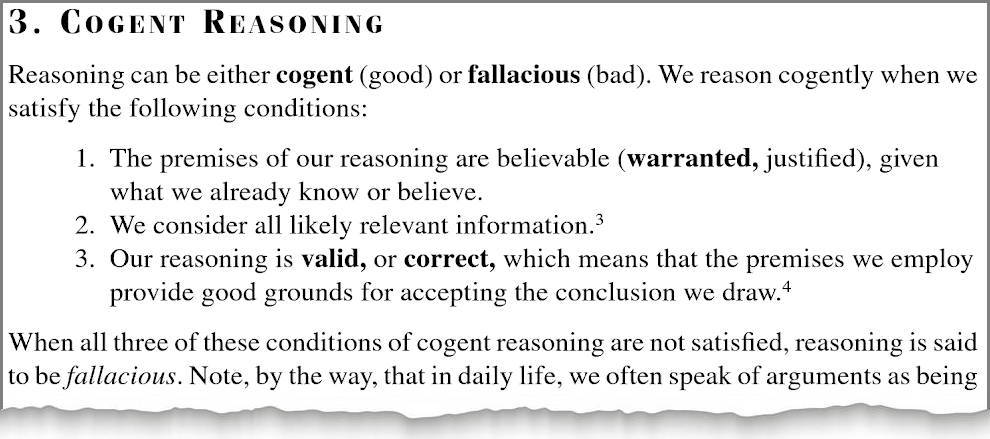Key terms and concepts
Observations on the way terms are being used in this course and on how to avoid common errors.
Arguments in Action
‘Cogent’
‘Cogency’ is no longer a mandatory concept. Previous versions of the Higher, where the glossary was part of the mandatory documentation, said:
| Cogency: a strong inductive argument which also has true premises is said to be cogent. |
This definition has been repeated in the more recent non-mandatory support notes. This is a reasonably widespread usage of ‘cogency’ in introductory textbooks but it does have some issues. Firstly, in assessing the truth of the premises this concept of cogency has the same issues as soundness. More importantly, the term ‘cogent’ has a wider application and unlike ‘valid’ it is not a simple matter of distinguishing between a technical use and a nontechnical use. Although a strong inductive argument with true premises would be cogent so would a sound deductive argument. To put it another way, all strong inductive arguments with true premises are cogent but not all cogent arguments are strong inductive arguments with true premises.
Perhaps the most useful definition for the Higher Course is given by Govier (p87) who says,

That is to say, a cogent argument is one where the premises are acceptable, relevant and sufficient. This is a definition given in a book that is now recommended in the 2018 Course Specification. However, it is important to repeat that, at the time of writing, the mandatory documents don’t give any specified definition of ‘cogent’ and the support notes use the more restricted use of ‘cogent’ and are silent about the wider use of the word.
A slightly different definition of cogency is given by Cavender and Kahane (p6). They say

It is important to note that in this definition they are using the nontechnical use of the word ‘valid’ and mean both deductively valid arguments and what others refer to as strong inductive arguments.
The second point is important. Consider the argument,
I’ve seen hundreds of swans and they have all been white therefore I conclude that all swans are white.
This might be punted as a strong inductive argument with a true premise. The second point would say this is not a cogent argument if the person was wilfully ignoring the fact that reliable sources of information say there are black swans but that their geographical location makes it likely that many people have never seen them.
This general approach to cogency also means that you can have inductive arguments that are weak but cogent. Bickenbach and Davies (p172) say,
